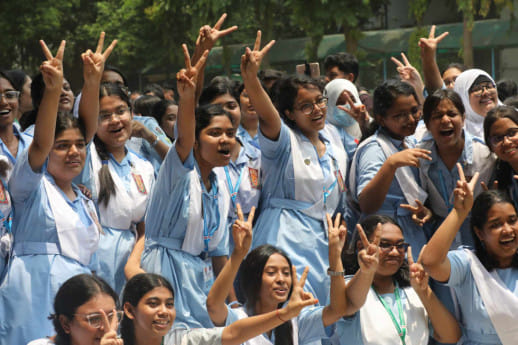Sorry parents, but GPA 5 is not the holy grail you think it is

Earlier today, the 2024 SSC results have been published. As always, all the conversations have veered to the attainment of GPA 5—the holy grail of board exams in Bangladesh. The headlines in newspapers are dominated by success stories surrounding SSC exams, including the number of students who earned GPA 5. TV channels, meanwhile, are broadcasting the familiar visual of students in school uniforms dancing to celebrate their results, many posing with the "V" sign.
But what about the students who did not score GPA 5? Does this "failure" mean they have been defeated? There is a palpable perception in some quarters that they may have.
Students and parents obsessing about the outcome of the two board exams has become a common aspect in our country over the last two decades. The ever-glorified GPA 5 system has played a central role in it. It is almost as if a student achieving GPA 5 has the same value as the mere passing of these exams once had in the past. The lives of students are being designed around such expectations from the first day of their preparation leading all the way up to the exam dates. A student's wish to learn a new skill, participate in an extracurricular activity, visit friends or family, play outdoors—all circle around their perceived level of preparation.
This sort of behaviour from parents, teachers and the wider society is absolutely unreasonable. While getting good grades in these exams definitely have a positive transitional value for students' future career, it is not the end of the world if they do not do well. It does not take a genius to figure that out. Good results in these exams can give students an edge in the public university admission race—and their parents the bragging rights for having an overachiever in the family—but should these considerations be allowed to overwhelm the students?
How many of them would eventually get into those desired public universities, anyway? Compared to the number of students who pass the exams, only a small percentage would make it to the University of Dhaka, BUET, Dhaka Medical College, etc.—where most parents want to enrol their children. What's left is almost 90 percent of the total number of students. Are they forever doomed? Absolutely not.
In reality, most parents and teachers understand this. Yet, the excessive emphasis on getting GPA 5 in these exams persists. This is largely because of the societal value attached to it. Students suffer from extreme pressure as these exams are treated as mass public events. We have seen in the past how this led to students committing suicide hours after their SSC or HSC results were published. Could those lives have not been saved?
Apart from the students committing suicide, there are a larger number who remain traumatised by the results. We don't have the data on this, but if you ask around, a lot of families would relate to such experiences. This surely has an adverse effect on the future life and career prospects of students, especially their confidence.
I think all of us can agree that not reaching a certain benchmark of success in board exams does not mean a failed future career, and obtaining a great result does not automatically guarantee a successful career. It's the constant effort and everyday activities that ultimately shape a fulfilling life. So, we should all work together to lessen the hype surrounding these exams. More importantly, parents should play a more supportive role in ensuring that their children don't view these exams as the sole determinant of their worth and future.
Monorom Polok is a member of the editorial team at The Daily Star
Views expressed in the article are the author's own
Follow The Daily Star Opinion on Facebook for the latest opinions, commentaries and analyses by experts and professionals. To contribute your article or letter to The Daily Star Opinion, see our guidelines for submission.




 For all latest news, follow The Daily Star's Google News channel.
For all latest news, follow The Daily Star's Google News channel.
Comments